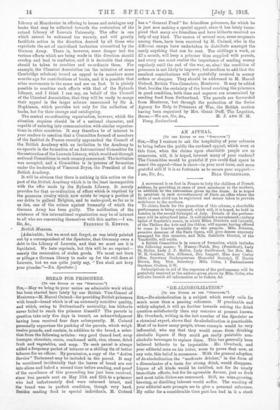BREAD FOR PRISONERS.
[To TAA EDITOR Or TUX "SrsorsTon.") SIR,—May we bring to your notice an admirable work which has been started here lately by our British Vice-Consul of Montreux—M. Marcel Cuenod—for providing British prisoners with bread—bread which is of an extremely nutritive quality, and which, owing to Switzerland's neutrality, has hitherto never failed to reach the prisoner himself P The parcels in question take only five days in transit, an acknowledgment having been received four days subsequently. M. Caned personally supervises the packing of the parcels, which weigh twelve pounds, and contain, in addition to the bread, a selec- tion from the following articles : very good tinned beef, soup lozenges, chocolate, cocoa, condensed milk, rice, cheese, dried fruit and vegetables, and soap. To each parcel is always added a fivepenny packet of tobacco or a shilling tin of better tobacco for an officer. By permission, a copy of the "Active Service" Testament may be included in the parcel. It may be mentioned incidentally that the loaves of bread are cut into slices and baked a second time before sending, and proof of the excellence of this proceeding has just been received, since two parcels sent on May 15th and 25th to a prisoner who had unfortunately died were returned intact, and the bread was in perfect condition, though very hard. Besides sending food to special individuals, M. Cuenod has a" General Fund" for friendless prisoners, for which he is just now making a special appeal, since it has lately trans- pired that many are friendless and have hitherto received no help of any kind. The names of several men, some sergeants among them, have been received by M. Cuenod, who in the different camps have undertaken to distribute amongst the needy anything that can be sent, Ten shillings a week, or ,e2 a month, will keep a prisoner thus supplied with parcels, and every one must realize the importance of sending money regularly until the end of the war, as, alas ! the condition of prisoners is not likely to improve; but needless to acid that the smallest contributions will be gratefully received in money orders or cheques. They should be addressed to M. Marcel Cuenod, British Vice-Consulate, Montreux. It may be added that, besides the certainty of the bread reaching the prisoners in good condition, both time and expense are economized by sending food from Switzerland. The parcels are forwarded from Montreux,' but through the protection of the Swiss Agency for Help to Prisoners of War, the British section having been organized by Mrs. Grant Duff, The Legation,










































 Previous page
Previous page